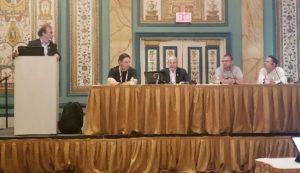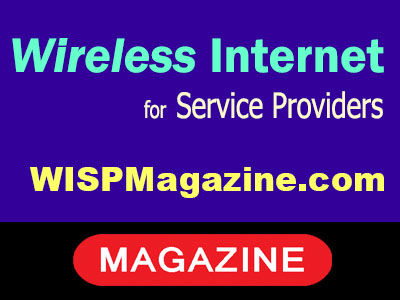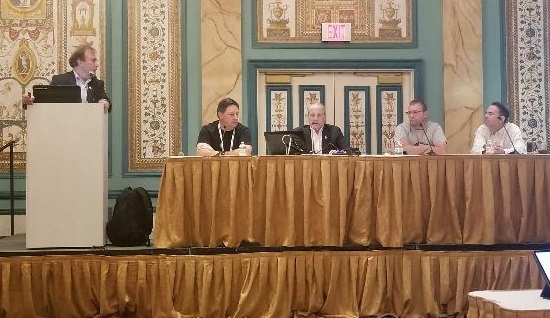From: WISPAPALOZA 2022 “Policy Changes” Session
By Jimmy Schaeffler
 Often the best telecom sessions I’ve moderated have been those involving collaboration. Making the speakers and audience part of a bigger team. In short, trying to help make the smartest folks in the room, make yours one of the better sessions. With three fixed wireless and hybrid fiber wireless operators, one DC-based outside trade group counsel, and three key audience participants, The Carmel Group assembles here the top takeaways from each of the seven, spread coast-to-coast, and all part of the fixed wireless and hybrid fiber wireless trade show October 3-6 in Las Vegas. For my part, my key takeaway is that the government has a real challenge on its hands, if it tries to treat these folks — and their consumers — unfairly. They know their stuff, and they care.
Often the best telecom sessions I’ve moderated have been those involving collaboration. Making the speakers and audience part of a bigger team. In short, trying to help make the smartest folks in the room, make yours one of the better sessions. With three fixed wireless and hybrid fiber wireless operators, one DC-based outside trade group counsel, and three key audience participants, The Carmel Group assembles here the top takeaways from each of the seven, spread coast-to-coast, and all part of the fixed wireless and hybrid fiber wireless trade show October 3-6 in Las Vegas. For my part, my key takeaway is that the government has a real challenge on its hands, if it tries to treat these folks — and their consumers — unfairly. They know their stuff, and they care.
Josh Luthman, Owner/President, Imagine Networks (Troy, OH-based operator): Key Takeaway – “Regularly call your state broadband office. Call until someone answers, then talk to them all about your business. Talk for at least 15-30 minutes. Let them see, let them hear, your interest and your passion, and your voice. Tell all about who you are, what you’re doing, what you are providing, why it matters, who your customers are. Make sure your state broadband office knows who you are, what it is you need them to do, and that you and your consumers are important.”
Matt Larsen, Owner, VistaBeam (Gering, NB-based operator): Key Takeaway – The unintended consequence of so much subsidy being dedicated to broadband is that actual deployment will be impeded by higher labor costs, supply shortages and delays while local and state offices sort through complex programs.”
Garth Nicholas, CFO, New Wave Net Corp (Heyworth, IL-based operator): Key Takeaway – This session from 4 experienced industry veterans covered key impacts of recent Federal policy changes and how Broadband providers can react and protect their businesses, with an increasing focus on state level advocacy in the coming years.
Steve Coran, Esq., Member, LermanSenter (Washington, DC-based attorneys at law): Key Takeaway – all broadband providers should comply with the Form 477 and Broadband Data Collection requirements or they will be overbuilt with federal funding.
Susan Myers, CEO and Managing Partner, Eastern Carolina Broadband (Pink Hill, NC-based operator) : Key Takeaway – “In the post COVID United States, the government is DUMPING printed money out of a helicopter, mostly to Oligopolies. The government has also taken it upon itself to determine which internet technology is preferred, regardless of economics. such as “cost to the home.” Unlike allowing the markets/businesses to make economic decisions regarding technology, the government thinks it knows best because it has been informed by heavy lobbying from the oligopolies. Furthermore, what business does the US Treasury department have setting speed requirements for the internet? As a small business owner with my own money invested, it has suddenly become very difficult to make wise, economically based business decisions. There is simply too much uncertainty, too much waste, too much money. We will not take government money for unwise business investments. That would be and is a Race to the Bottom.”
Andy Main, CEO, Shasta Broadband (Shasta, CA-based operator): Key Takeaway –”All WISPs need to step up to the plate and play the DC Game like the big companies do, or we will wallow in mediocrity. Working together and individually, we need to impact policy decisions towards the betterment of our communities, bringing ‘Better Internet Every Day’ to Rural America. We all need to be firing on all cylinders to stay in contest and make a difference in middle America.”
Samual Curtis, CEO, AtLink (OKC, OK-based operator): Key Takeaway – “Given our national debt has tripled to $30 trillion since the 2008 housing crisis, and the likely change in party influence in DC, could the planned $42 billion of BEAD money possibly be retracted, given the lack of states’ abilities to distribute it within four years?”
[1] The full session title held Thursday 3-4p, October 6, was “Policy Changes: Their Effects On Your Business, And Practical Strategies To Reduce Or Eliminate Their Debilitating Effects.”

